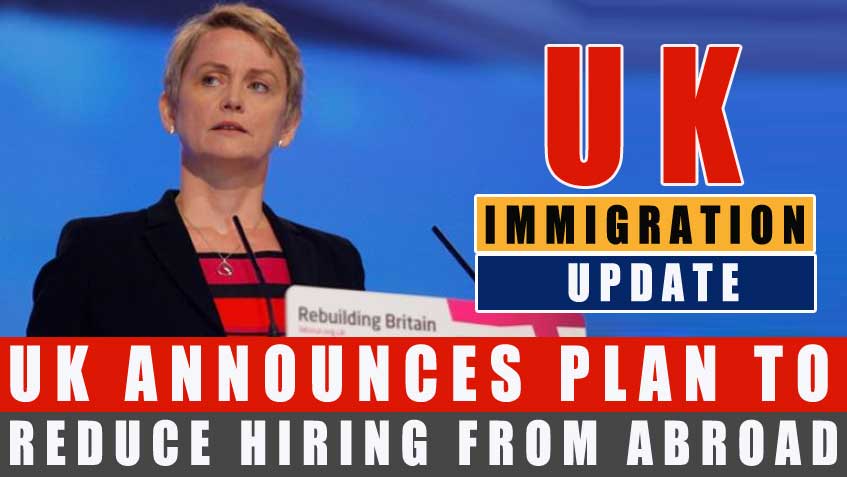UK Immigration Update – UK announces plan to reduce hiring from abroad
UK Immigration Update : UK announces plan to reduce hiring from abroad. Independent migration advisers are requested by the home secretary to assess the system, which “needs to be managed.”

After requesting an assessment of the technology and engineering sectors’ reliance on skilled worker visas from its independent migration experts, Sir Keir Starmer’s administration has made it clear that it intends to reduce hiring abroad by these industries.
On Wednesday, Yvette Cooper requested that the Migration Advisory Committee look into whether tech and engineering jobs were lacking, if compensation, benefits, and working conditions were to blame for any gaps, and how companies had tried to adjust without resorting to employing foreign workers.
In a letter to the MAC, the home secretary stated that although the government was “extremely grateful for the contribution that people from all over the world make to our economy,” “the system needs to be managed and controlled.”
JOIN WITH US WHATSAPP CHANNEL: https://whatsapp.com/channel/0029Va4bIhd6GcGCVFJLgE2L
High rates of foreign hiring were indicative of the UK labour market’s flaws and ongoing skills gaps, and Cooper noted that “the system as it exists is not operating in the national interest.”
Cooper requested a report from the MAC in nine months on how the immigration system “could be used more effectively” to encourage companies to concentrate on hiring domestic workers. She mentioned that this might entail lowering the pay levels for some important roles where there are already shortages.
Cooper has shifted from the previous Conservative government’s post-Brexit approach to immigration policy, which prohibited firms from sponsoring visas for low-skilled labour but placed minimal restrictions on high earners, to focussing on recruiting in two relatively well-paid, highly skilled fields.
In an attempt to reduce immigration from a recent high of 745,000, the Tories announced significant hikes in income limits for skilled workers last year. Currently, they must typically earn at least the median for their occupation.
The care industry, where hiring from outside had increased, was the target of their biggest crackdown, while a restriction on migrant workers bringing family members has resulted in a dramatic decline in the number of new hires.
Labour intends to establish stronger ties between the MAC and its recently established Skills England authority in order to build a pipeline of homegrown talent to fill positions where skills have consistently been in short supply. Labour has also promised to further reduce immigration, including through work-related pathways.
About one in six skilled worker visas are awarded to employers in the computer sector; programmers and IT business analysts are in particularly high demand, according to Home Office data.
Engineers make up a smaller percentage of visa applicants, but manufacturers have made a strong push to reduce visa requirements for some technicians with lower skill levels because they claim there are critical positions in the UK that are particularly challenging to fill.
In the year ending in March 2024, the Home Office issued 67,703 skilled worker visas, a 2% decrease from the year before.
The MAC’s review, according to Verity Davidge, head of policy at manufacturers’ organisation Make UK, would be “a great cause of concern” for an industry with 62,000 active job openings and no immediate means of training replacements for ageing, experienced staff.
“To assist expand the skill pool, we truly need a new administration. We fear that regulations may become more stringent,” she stated.
In addition to regulations specific to various areas or professions, Cooper stated that the MAC may take into account “a wide range of options.” However, “these must be balanced against the risks of undercutting the wages of British workers and of overcomplicating the system.”
According to Nimmi Patel, TechUK’s head of skills, talent, and diversity, the trade association applauds the emphasis on expanding the domestic talent pipeline.
Yet, she went on, it would provide the MAC with information regarding ongoing skill shortages that specifically impacted data centres, cyber security, telecoms, and spectrum regulation. It would also argue that immigrants were “an addition to homegrown skills…that is really nice to have.”
UK immigration updates 2024: Will Starmer make it harder for you to get a job there?
JOIN WITH US WHATSAPP CHANNEL: https://whatsapp.com/channel/0029Va4bIhd6GcGCVFJLgE2L
